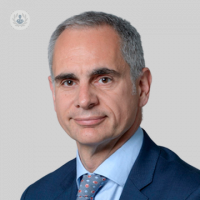What are thyroid nodules, and can they become cancerous?
Written in association with:In this informative article below, highly respected consultant ENT surgeon, Mr Ricard Simo, walks us through the main symptoms associated with thyroid nodules, before going on to outline the main causes, and how they are treated.

What are thyroid nodules? What are their symptoms?
Thyroid nodules are very common. They represent a focal enlargement of the thyroid gland which often manifests with the presence of a lump in the front part of the neck where the thyroid gland is. Nodules could be very small and not palpable. However, if we use an ultrasound scan, we could detect small nodules under 1 cm in 60 per cent of women and 30 per cent of men.
What causes thyroid nodules?
The causes of thyroid nodules are generally unknown. In some cases, the causes are associated with the presence of an underactive thyroid and other times an overactive thyroid. In nodules where there is no thyroid function abnormality, it is thought that it might be a lack of focal uptake of the iodine from the diet (which is the main component of the thyroid hormone) and that could potentially make that area of the thyroid grow. Thyroid cancer often presents as a thyroid nodule and therefore its evaluation by an specialist is imperative.
Can thyroid nodules become cancerous?
Most thyroid nodules are benign. Only 10 per cent are malignant. However, some patients with thyroid disorders such as autoimmune thyroiditis or patients with a history of thyroid cancer may be more predisposed to develop cancer of this gland.
How are thyroid nodules treated?
It all depends of the nature of the nodule. Surgery, however, remains a treatment of choice for patients with suspected or proven thyroid cancer. For benign symptomatic nodules, other new treatments such as alcohol ablation of radiofrequency ablation may be an option.
Do thyroid nodules always need to be removed?
Not always. Most benign nodules with no symptoms or without significant cosmetic deformity do not require treatment and these represent the majority. However, surgery remains a treatment of choice for patients with thyroid cancer or patients with large nodules or goitres causing compression symptoms.
To schedule in a consultation with Mr Ricard Simo, simply visit his Top Doctors profile today.



